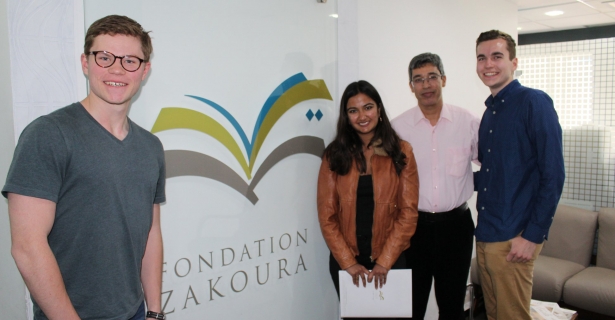We spent our last day in Morocco in Casablanca. Needless to say, this day too saw a perfect symbiosis of work and fun. Our accommodation for this last part of our journey was in a hostel in the center of the Medina. This hostel provided a space where we have been able to interact with other travelers from across the world and share their experiences of Morocco with our understanding of the country. Living in the Medina has given us the ability to be in the center of life in Casablanca and enjoy the most of our little time in this city.
While many of us were awake late in the night talking to these tremendously interesting people, we still headed out in the early hours of the morning to maximize our time. As usual given the size of the group, we split into various groups.
Kai, Taylor, Josh and Vinicius met Mohamed Zaari, the director general of the Zakoura Foundation, an educational NGO working to ameliorate the poor learning conditions in rural areas. Zakoura runs schools, trains teachers, and provide materials to encourage education. They also run a program to train young, disadvantaged high school graduates to work in recycling and woodworking. They were extremely welcoming and even posted about us to their Facebook page! The link to the site is here. The group also went to Hassan II University of Casablanca to handout surveys, and they have now accumulated a great database of knowledge regarding the preferences and grievances of Moroccan youth.
Many of us started our day visiting the Hassan II mosque: a marvel of modern engineering and Islamic architecture. Kai described it as standing at the intersection of rocky earth and willful sea, built at the utmost edge of Casablanca. With every graceful inch of its façade standing as a testament to this powerful contrast, the mosque served as a hymn to its divine creator. For some of us, it was the first time we had visited a mosque and it was a unique experience, as this is Africa’s biggest mosque as well.
Uzair continued his streak of interviews and met with Salman Mir, the Director of Finance at the Pakistan Maroc phosphate group. He spoke at length on the role of water in Morocco’s large phosphate industry, as well as the urban water system in Casablanca.
Aly and Eran continued their explorations in Marrakesh, visiting Le Jardin Secret, an early-modern (18th century) palace built by the Almoravids that was renovated in 2013 and was opened to the public in 2016. It includes botanical gardens full of plants endemic to North Africa and a contemporary art gallery currently displaying the works of Iraqi-Moroccan artist Taha Sabie. They also visited the Riad Yima, a concept store and tea room created by the Moroccan pop artist Hassan Hajjaj. He is known as the “Andy Warhol” of Morocco; colorful decorations full of Moroccan references.
In contrast with this architecture, Arjun and I walked through the industrial centers of downtown Casablanca, visited the Casa port and had our fair share of travel in the city.
In the afternoon, Arjun, Vinicius, Connor, Dante and I visited the Moroccan Institute of International Relations and had a productive interaction with Consular General Kerdoudi Jawad. Not only was he the representative of India in Morocco, but also the president of the organization. For all of us, this discussion was immensely helpful. He traced the evolution of Morocco’s involvement with Africa and the current strategies employed by the King to reintegrate Morocco, especially within West Africa and ECOWAS. He also touched on the issue of the Western Sahara and its linkages with Morocco’s re-entry in the African Union. He helped me trace the problems associated with the left in their 1997 rise to power and the current fragmentation of its political base. We also had a wonderful interaction involving migration policy and the issue of the Amazigh population.
Our second interview was with an independent journalist, Omar Rotala. This interview stood out to me personally because of Omar’s involvement with, and his criticism of, the land-acquisition policies of the Moroccan government. Working with both the teachers’ protests and the doctors’ strike happening in the country, Omar provided various insights and ideas as to the incompatibility of the left with the protests on the street. He was greatly critical of international institutions, notably the IMF and the World Bank and their role in perpetuating the cycle of inequality and dependence in the country.
Since Arjun and Dante accompanied me, I also had the opportunity to listen to his views on migration policy and Morocco’s integration in the African Union. He linked the issue of the migration of sub-Saharan populations to Western Sahara and the ability of the government to leverage European migration to gain legitimacy for its control of the Sahara. He further delved into the racism within migration and the problems with the government’s approach on this issue. This interview provided me with interesting material and was arguably my favorite one of my entire stay in Morocco.
We sleep our last night in Morocco today and it has been an extremely worthwhile experience for all of us. Coupled with the academic exposure, it has been a journey to explore the country through the very versatile ability of the many French and Arabic speakers in our group. We have seen four cities, we have met think-tanks, ministers, NGOs, civil society members who are doing inspirational work; It has been a transformational journey for all of us and though our last journey back home remains, we sleep at ease tonight. We cannot be grateful enough for all who have in any way shape or form, helped us to be on this trip.

